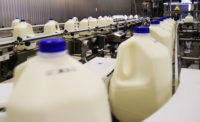Keep milk on the table
There’s a strong movement toward plant-based eating. By emphasizing dairy milk’s unique nutrients, the dairy industry can help ensure milk will be a key part of plant-based diets well into the future.




Plant-based diets are gaining traction among consumers, institutions and even government-recommended dietary guidelines. Although the health benefits of consuming more vegetables, fruits and plant-based proteins are well-founded, “plant-based” is sometimes misconstrued to mean the elimination of animal-derived foods such as dairy milk. This view, plus the rise in plant-based products that imitate dairy milk but lack its unique combination of nutrients, creates an urgent need for the dairy community to ensure dairy milk remains an essential part of healthy eating patterns in the future.
Dairy Council of California continues to educate that all beverage choices matter and contribute to total calorie intake and hydration. Focusing on nutrient-dense beverages such as dairy milk can help children and families build healthy eating patterns. Dairy milk offers a unique package of nutrients — calcium, vitamin D, potassium, protein and much more — that work together to provide multiple health benefits, including optimal growth and development in children and reduced risk of chronic diseases.
While Dairy Council of California continues to support consumers’ right to choose from a variety of beverages, ensuring milk remains a part of healthy diets is critical, particularly with children and families, as milk offers important nutrients in unique proportions not found in other foods. For children ages 2-18, dairy — particularly milk — is the No. 1 source of calcium, vitamin D and potassium in the diet.
Plant-based eating patterns gain support
The three eating patterns recommended in the 2015-2020 Dietary Guidelines for Americans use a plant-based diet as their foundation. The guidelines support eating more plant foods to promote good health, but these recommendations also acknowledge the importance of nutrients supplied in the diet through dairy milk. As such, all three eating patterns include low-fat and fat-free dairy options.
These patterns also incorporate vegetables, fruits, whole grains and lean protein, with the ultimate goal of promoting health and reducing the risk of chronic diseases. While the recommendations are clear, many Americans are underconsuming these important foods, and nutrient gaps exist.
In addition to the most current Dietary Guidelines, institutional food systems — including those at hospitals and schools — are at the forefront of implementing plant-based eating strategies. In fact, large foodservice management companies are partnering with health advocacy groups to offer plant-based recipes for use in contracted facilities, which range from hospitals to schools to universities.
All ‘milk’ is not created equal
Under the current FDA framework, “milk” is a “lacteal secretion” obtained by “milking one or more healthy cows,” yet this vernacular is being used to describe products derived from almonds, coconuts, pecans and even oats. In July 2018, the debate over how to define milk in the future was brought to the forefront when the FDA began examining information on consumer perceptions and understanding of plant-based foods and beverages.
“The FDA has concerns that the labeling of some plant-based products may lead consumers to believe that those products have the same key nutritional attributes as dairy products, even though these products can vary widely in their nutritional content,” said FDA Commissioner Scott Gottlieb.
“We’re interested to know if consumers are aware of, and understand, the nutritional characteristics and differences among these products — and between these products and dairy — when they make dietary choices for themselves and their families,” Gottlieb said.
With the exception of fortified soy beverages, plant-based juices and other beverages are not appropriate to replace milk as a main beverage choice, particularly for young children. Drinks made from almonds or other nuts, oats or coconuts often contain little to no protein and lack other key nutrients important to support optimal growth. Dairy milk has the most balanced distribution of energy from carbohydrates, protein and fat, coupled with a unique nutrient package that can be difficult to replace in healthy dietary patterns.
Values driving decisions
While the nutritional science around dairy milk and plant-based beverages is clear, it’s not always science that drives decisions. In fact, Dairy Council of California’s trends tracking system is seeing an increase in consumers making decisions based on a variety of values-based criteria such as care for animals and sustainability concerns.
The dairy industry can help build trust by acknowledging public concerns and engaging in constructive dialogue around topics of interest to customers and consumers alike. Importantly, the industry has made significant strides in environmental stewardship, animal care and adherence to values that align with dairy consumers. Dairy producers and processors would be wise to share industry progress with stakeholders on topics such as reducing greenhouse gas emissions, conserving water, using energy efficiently and consistently doing more with less.
For the dairy community, focusing on the nutritional qualities of milk and dairy foods and the improvements within the industry related to sustainability is a way to strike a balance among nourishing people, caring for animals and sustaining the environment.
Ensuring milk’s place at the table
The move toward plant-based eating isn’t going away. In spite of this changing landscape, one thing remains steadfast — the fact that dairy milk provides a high-quality source of protein with a unique combination of nutrients that support optimal health.
Helping consumers, especially families with young children, understand the importance of including nutrient-dense dairy foods in their diet is essential, and the dairy community should work collaboratively to advocate for the critical role of milk and dairy foods in healthy eating patterns. This work will be increasingly important as institutional food programs continue to evaluate the role of dairy in plant-based menus.
By emphasizing dairy milk’s unique nutrients, the dairy industry can help ensure that milk can continue to maintain access to such programs and distinguish itself as a key part of plant-based diets well into the future. More importantly, the dairy industry can advance its cause adopted nearly 100 years ago through Dairy Council of California: to elevate the health of children and families through the pursuit of lifelong healthy eating habits.
Looking for a reprint of this article?
From high-res PDFs to custom plaques, order your copy today!









